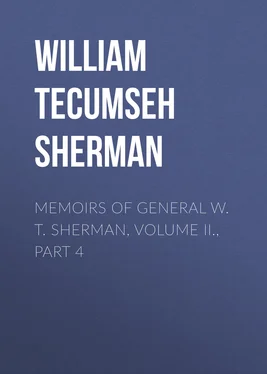William Tecumseh Sherman - Memoirs of General W. T. Sherman, Volume II., Part 4
Здесь есть возможность читать онлайн «William Tecumseh Sherman - Memoirs of General W. T. Sherman, Volume II., Part 4» — ознакомительный отрывок электронной книги совершенно бесплатно, а после прочтения отрывка купить полную версию. В некоторых случаях можно слушать аудио, скачать через торрент в формате fb2 и присутствует краткое содержание. Жанр: Биографии и Мемуары, История, foreign_edu, foreign_antique, foreign_prose, на английском языке. Описание произведения, (предисловие) а так же отзывы посетителей доступны на портале библиотеки ЛибКат.
- Название:Memoirs of General W. T. Sherman, Volume II., Part 4
- Автор:
- Жанр:
- Год:неизвестен
- ISBN:нет данных
- Рейтинг книги:5 / 5. Голосов: 1
-
Избранное:Добавить в избранное
- Отзывы:
-
Ваша оценка:
- 100
- 1
- 2
- 3
- 4
- 5
Memoirs of General W. T. Sherman, Volume II., Part 4: краткое содержание, описание и аннотация
Предлагаем к чтению аннотацию, описание, краткое содержание или предисловие (зависит от того, что написал сам автор книги «Memoirs of General W. T. Sherman, Volume II., Part 4»). Если вы не нашли необходимую информацию о книге — напишите в комментариях, мы постараемся отыскать её.
Memoirs of General W. T. Sherman, Volume II., Part 4 — читать онлайн ознакомительный отрывок
Ниже представлен текст книги, разбитый по страницам. Система сохранения места последней прочитанной страницы, позволяет с удобством читать онлайн бесплатно книгу «Memoirs of General W. T. Sherman, Volume II., Part 4», без необходимости каждый раз заново искать на чём Вы остановились. Поставьте закладку, и сможете в любой момент перейти на страницу, на которой закончили чтение.
Интервал:
Закладка:
I have seen much skill and industry displayed by these quarter-masters on the march, in trying to load their wagons with corn and fodder by the way without losing their place in column. They would, while marching, shift the loads of wagons, so as to have six or ten of them empty. Then, riding well ahead, they would secure possession of certain stacks of fodder near the road, or cribs of corn, leave some men in charge, then open fences and a road back for a couple of miles, return to their trains, divert the empty wagons out of column, and conduct them rapidly to their forage, load up and regain their place in column without losing distance. On one occasion I remember to have seen ten or a dozen wagons thus loaded with corn from two or three full cribs, almost without halting. These cribs were built of logs, and roofed. The train-guard, by a lever, had raised the whole side of the crib a foot or two; the wagons drove close alongside, and the men in the cribs, lying on their backs, kicked out a wagon-load of corn in the time I have taken to describe it.
In a well-ordered and well-disciplined army, these things might be deemed irregular, but I am convinced that the ingenuity of these younger officers accomplished many things far better than I could have ordered, and the marches were thus made, and the distances were accomplished, in the most admirable way. Habitually we started from camp at the earliest break of dawn, and usually reached camp soon after noon. The marches varied from ten to fifteen miles a day, though sometimes on extreme flanks it was necessary to make as much as twenty, but the rate of travel was regulated by the wagons; and, considering the nature of the roads, fifteen miles per day was deemed the limit.
The pontoon-trains were in like manner distributed in about equal proportions to the four corps, giving each a section of about nine hundred feet. The pontoons were of the skeleton pattern, with cotton-canvas covers, each boat, with its proportion of balks and cheeses, constituting a load for one wagon. By uniting two such sections together, we could make a bridge of eighteen hundred feet, enough for any river we had to traverse; but habitually the leading brigade would, out of the abundant timber, improvise a bridge before the pontoon-train could come up, unless in the cases of rivers of considerable magnitude, such as the Ocmulgee, Oconee, Ogeechee, Savannah, etc.
On the 20th of November I was still with the Fourteenth Corps, near Eatonton Factory, waiting to hear of the Twentieth Corps; and on the 21st we camped near the house of a man named Mann; the next day, about 4 p.m., General Davis had halted his head of column on a wooded ridge, overlooking an extensive slope of cultivated country, about ten miles short of Milledgeville, and was deploying his troops for camp when I got up. There was a high, raw wind blowing, and I asked him why he had chosen so cold and bleak a position. He explained that he had accomplished his full distance for the day, and had there an abundance of wood and water. He explained further that his advance-guard was a mile or so ahead; so I rode on, asking him to let his rear division, as it came up, move some distance ahead into the depression or valley beyond. Riding on some distance to the border of a plantation, I turned out of the main road into a cluster of wild-plum bushes, that broke the force of the cold November wind, dismounted, and instructed the staff to pick out the place for our camp.
The afternoon was unusually raw and cold. My orderly was at hand with his invariable saddle-bags, which contained a change of under-clothing, my maps, a flask of whiskey, and bunch of cigars. Taking a drink and lighting a cigar, I walked to a row of negro-huts close by, entered one and found a soldier or two warming themselves by a wood-fire. I took their place by the fire, intending to wait there till our wagons had got up, and a camp made for the night. I was talking to the old negro woman, when some one came and explained to me that, if I would come farther down the road, I could find a better place. So I started on foot, and found on the main road a good double-hewed-log house, in one room of which Colonel Poe, Dr. Moore, and others, had started a fire. I sent back orders to the "plum-bushes" to bring our horses and saddles up to this house, and an orderly to conduct our headquarter wagons to the same place. In looking around the room, I saw a small box, like a candle-box, marked "Howell Cobb," and, on inquiring of a negro, found that we were at the plantation of General Howell Cobb, of Georgia, one of the leading rebels of the South, then a general in the Southern army, and who had been Secretary of the United States Treasury in Mr. Buchanan's time. Of course, we confiscated his property, and found it rich in corn, beans, pea-nuts, and sorghum-molasses. Extensive fields were all round the house; I sent word back to General David to explain whose plantation it was, and instructed him to spare nothing. That night huge bonfires consumed the fence-rails, kept our soldiers warm, and the teamsters and men, as well as the slaves, carried off an immense quantity of corn and provisions of all sorts.
In due season the headquarter wagons came up, and we got supper. After supper I sat on a chair astride, with my back to a good fire, musing, and became conscious that an old negro, with a tallow-candle in his hand, was scanning my face closely. I inquired, "What do you want, old man!" He answered, "Dey say you is Massa Sherman." I answered that such was the case, and inquired what he wanted. He only wanted to look at me, and kept muttering, "Dis nigger can't sleep dis night." I asked him why he trembled so, and he said that he wanted to be sure that we were in fact "Yankees," for on a former occasion some rebel cavalry had put on light-blue overcoats, personating Yankee troops, and many of the negroes were deceived thereby, himself among the number had shown them sympathy, and had in consequence been unmercifully beaten therefor. This time he wanted to be certain before committing himself; so I told him to go out on the porch, from which he could see the whole horizon lit up with camp-fires, and he could then judge whether he had ever seen any thing like it before. The old man became convinced that the "Yankees" had come at last, about whom he had been dreaming all his life; and some of the staff officers gave him a strong drink of whiskey, which set his tongue going. Lieutenant Spelling, who commanded my escort, was a Georgian, and recognized in this old negro a favorite slave of his uncle, who resided about six miles off; but the old slave did not at first recognize his young master in our uniform. One of my staff-officers asked him what had become of his young master, George. He did not know, only that he had gone off to the war, and he supposed him killed, as a matter of course. His attention was then drawn to Spelling's face, when he fell on his knees and thanked God that he had found his young master alive and along with the Yankees. Spelling inquired all about his uncle and the family, asked my permission to go and pay his uncle a visit, which I granted, of course, and the next morning he described to me his visit. The uncle was not cordial, by any means, to find his nephew in the ranks of the host that was desolating the land, and Spelling came back, having exchanged his tired horse for a fresher one out of his uncle's stables, explaining that surely some of the "bummers" would have got the horse had he not.
The next morning, November 23d, we rode into Milledgeville, the capital of the State, whither the Twentieth Corps had preceded us; and during that day the left wing was all united, in and around Milledgeville. From the inhabitants we learned that some of Kilpatrick's cavalry had preceded us by a couple of days, and that all of the right wing was at and near Gordon, twelve miles off, viz., the place where the branch railroad came to Milledgeville from the Mason & Savannah road. The first stage of the journey was, therefore, complete, and absolutely successful.
Читать дальшеИнтервал:
Закладка:
Похожие книги на «Memoirs of General W. T. Sherman, Volume II., Part 4»
Представляем Вашему вниманию похожие книги на «Memoirs of General W. T. Sherman, Volume II., Part 4» списком для выбора. Мы отобрали схожую по названию и смыслу литературу в надежде предоставить читателям больше вариантов отыскать новые, интересные, ещё непрочитанные произведения.
Обсуждение, отзывы о книге «Memoirs of General W. T. Sherman, Volume II., Part 4» и просто собственные мнения читателей. Оставьте ваши комментарии, напишите, что Вы думаете о произведении, его смысле или главных героях. Укажите что конкретно понравилось, а что нет, и почему Вы так считаете.












